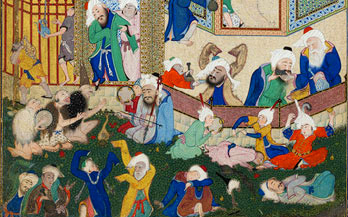Pir 'Abdullah Ansari was one of the great Persian Sufi
teachers of the 11th century. In a little book called
Munajat, Pir Ansari recorded a number of insightful prayers
which show the way that he thought about prayer, and the way
that we too can humble our little self unto the Greater
Power.
As is the case with many Sufi teachings, these
prayers have multiple levels of meaning. On the surface
they show the need for humility, but when one looks deeper, the prayers
give us hope and courage, because they remind us that God is the ultimate
Teacher, Guide and Friend
who desires to express love, harmony and beauty through our
own lives.
On the surface, the prayers seem to be asking for
something, but on a deeper level they are a celebration of
the precious gifts which have already been granted to each
of us, if only we have the wisdom to rise above our
habitual self-centered viewpoint and embrace the great flow
of wonder, peace and might which is being showered upon us
in every moment by the beneficent and ever-merciful Divine
Presence.
In glory Thou art merciful, in perfection
divine;
Neither need of space nor wish for time hast
Thou;
No being is like Thee, nor art Thou like any.
Clearly Thou art within the soul,
and the soul lives
by what Thou art...
Pir-i Ansari has drained a cup of
the Wine of Love;
Like Majnun, he wanders drunken and
bewildered over the world.
O God, by the mercy of the Name that Thou
art,
And by the honor of those qualities which are
Thine,
Come to my rescue, since Thou alone has the
power.
O God let my eye see naught but how Thou
dost nourish and sustain me,
And my heart choose
naught but the way of Thy servitude.
O God, when I consider Thee, I am a king
among kings,
there is a crown upon my head,
But
when I consider myself, I am one of the bereft,
and
upon my head is dust.
O God, I confess my weakness and my
helplessness,
I am aware of Thy kindness and thy
bounty.
O God, the pure must beseech Thy
forgiveness;
What must the impure do?
O God, could I have forgiven sins from the
beginning,
I would never have committed one.
O God, all fear Thee, but Thy Abdullah
fears himself,
For from Thee comes all good and from
him all evil.
O God, how can I avoid my fate?
And
where shall I run from what shall be?
O God though my sins are inordinate,
Thy
forgiveness is unlimited.
O God, with Thy favor there is no need for
refuge at any threshold.
Ahead lies danger, and I
have no way back.
Take my hand, for other than Thee I
have no refuge.
O God, what virtue is this that accompanies Thy
friends?
With what privilege hast thou brought them
into the world,
That whosoever found Thee would know
them,
And whosoever knew them would find Thee!
O God, whatever Thou hast offered I have bought;
From the two worlds I have chosen Thy friendship alone.
O God, beside Thy love all fires are cold;
Without Thy love all favor is pain.
O God, though the night of separation is dark,
yet I am satisfied,
For the morning of union is near.
O God, though Satan misguided Adam,
Who gave him
his daily bread?
O God, lift this veil from the Way
And
abandon us not to ourselves.
O God, out of Mecca came Abu Jahl (an enemy of
the religion),
And from a temple of idols Abraham,
It is a matter of grace, all else is pretext.
O God what Thou hast sewn I have worn,
And what Thou hast poured into my cup I have drunk;
Naught of this, for all my striving, was of me.
O God... my heart sings always of its longing for
Thee,
The soul in my body breathes for Thee,
And
if someday a plant grows upon my grave,
Each leaf
will emanate the fragrance of Thee.
Khwājah 'Abd Allāh Ansārī, Munājāt,
The Intimate Prayers, trans Lawrence Morris and Rustam
Sarfeh, New York, 1975
Notes:
For bibliographical information about
the life and times of Khwajah 'Abdullah Ansari, see:
http://en.wikipedia.org/wiki/Khwaja_Abdullah_Ansari


